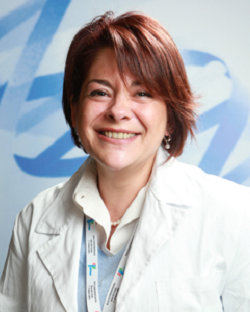
Neuroimmunology
Neuroimmunology

The central nervous system (CNS) has the intrinsic capability to repair itself when injured. Over the years a series of molecular and cellular innate repair mechanisms have been discovered and their ability to prevent irreversible tissue damage and irreversible neurological deficits has been characterized. Among cellular mechanisms, those sustained by neural stem/precursor cells (NPCs); the self-renewing and multipotent cells of the CNS capable of driving neurogenesis and gliogenesis during development and adult life; play a crucial role. On one hand, endogenous NPCs maintain CNS homeostasis via a series of different mechanisms of action among which the most important ones are the production of newly generated neuronal and glial cells and the release of neuroprotective substances.
The Unit research activity is mainly focused on the study of the molecular and cellular pathways sustaining both spontaneous and reparative CNS regenerative processes in both the healthy and pathological conditions such as inflammation and neurodegeneration. The ultimate main goal of the unit is to develop more efficacious therapeutic strategies to combat still incurable CNS pathological conditions.
Research activity
- Analyze which are the molecular pathways that support the development of the brain during embryonic life and to understand whether or not those pathways are recapitulated after an inflammatory and/or degenerative insult in order to promote the regeneration of the CNS
- Understand the molecular mechanisms that alter synaptic function during inflammatory processes and/or degenerative CNS processes
- Develop genetic tools to study the function of endogenous NPCs residing within the CNS during the development and in the adult life, both in physiological and pathological conditions
- Analyze the role of endogenous NPCs in maintaining the homeostasis of the CNS and/or to induce tissue repair by developing genetic and molecular tools capable of marking or effectively eliminate these cells
- Establish alternative therapeutic strategies based on the transplantation of adult or reprogrammed NPCs or aimed at fostering the reparative potential of endogenous NPCs in acute and chronic CNS inflammatory disorders leading to irreversible neurodegeneration (i.e. multiple sclerosis, stroke and spinal cord injury).
Marco Bacigaluppi
Research associate
Andrea Bergamaschi
Technician
Svetlana Bezukladova
Postdoc fellow
Elena Brambilla
Technician
Erica Butti
Technician
Celeste Calandi
Master Student
Luca Coccoluto
Predoctoral Fellow
Eleonora Colombo
Postdoc Fellow
Patrizia D'Adamo
Research associate
Beatrice Dell'Acqua
Resident
Martina Di Nunzio
Postdoc Fellow
Marta Facchinetti
Master Student
Davide Ferrati
Predoctoral Fellow
Angela Genchi
PhD Student
Federico Lucchi
Master Student
Maria Lidia Mignogna
Postdoc Fellow
Valentina Murtaj
Postdoc fellow
Paola Panina
Research associate
Jessica Perego
Postdoc fellow
Carolina Peri
Postdoc fellow
Luca Muzio
Research associate
Andrine Mykjaland Risoy
Predoctoral Fellow
Francesca Ruffini
Technician
Aurora Semerano
Clinical fellow
Diana Morena Silipo
Predoctoral Fellow
Stefano Taverna
Research Associate
Maria Vasilaki
Predoctoral Fellow

























